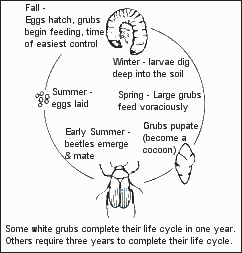Your Cart

What are White Grubs?
Tips from Weed Man Denver
White grubs are the larvae of European chafer, Japanese, and May & June beetles. These small, plump, white larvae live beneath the surface of the lawn and voraciously chew on grass roots. They are often found in their signature c-shaped position in the soil.
Grub Damage
Grubs chew away at the roots of grass plants, causing the lawn to appear yellow in patches. Because the damage often looks similar to dryness or drought, many Denver Weed Man customers mistakenly assume that the lawn simply needs more water.
Additional detection tips:
- Grub damaged turf will become spongy and roll back like a carpet, as the root system has been entirely eaten away.
- Animals like skunks and raccoons may dig up the lawn looking for their next meal.
- Birds often feed on a grub-infested lawn and leave behind pencil-sized holes.
Serious grub damage can occur in the spring, summer and fall. If the problem is ignored, the discolored patches will only get larger. The damaged areas will then die out or fill in with weeds and crabgrass. The best time to treat grubs is when they are very young, before you are faced with severe damage.
 Life Cycle
Life Cycle
To control an insect population we must understand its habits and life cycle. Some grubs complete their life cycle in one year. Others require three years to complete their life cycle. White grubs survive the winter as larvae in the soil. In the early spring the grubs begin to feed again. Later in the spring and summer, they enter a resting stage (pupae) then hatch into adult beetles. Denver Weed Man customers beware! Lots of beetles can mean a grub problem later (the beetles themselves do not damage lawns). Beetles lay their eggs which hatch into grub larvae.
Control
Your Denver Weed Man is a trained specialist. He can recognize the difference between a simple drought problem and a serious white grub infestation. We use materials that are applied carefully and precisely at the correct time to be the most effective in controlling grubs.

